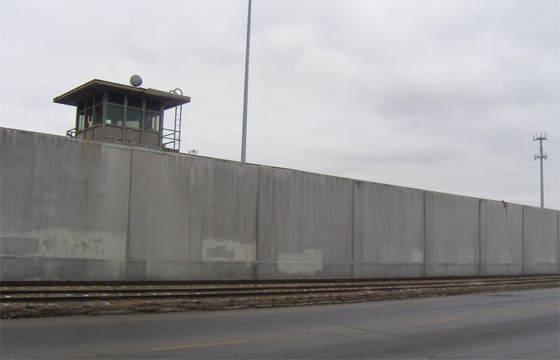| « Midwest Action Against Drones Protests Boeing Chicago Headquarters | Dan Linn: Illinois NORML, Yes We Cannabis! » |
Op-Ed Wed Oct 02 2013
Chicago's Forgotten End Up at Cook County Jail
Cook County Jail has drawn attention to itself lately for collecting large amounts of Chicago's mentally ill, so much so that it has become the largest mental health facility in Illinois.
The story is particularly inflammatory given Gov. Pat Quinn's corresponding funding cuts to Illinois mental health facilities, and the closing of six Chicago mental health clinics last year.
Cook County Sheriff Tom Dart has been vocal in condemning the incarceration of Chicago's mentally ill, who he says are regularly falling through the cracks of an at-capacity (and underfunded) prison system despite his best efforts to provide therapy and medication to those in need.
"This is a population that people don't care about and so as a result of that there are not the resources out there to care for them," Dart said in an interview on CBS 60 Minutes Sunday night.
In saying this, Dart touches on an even larger issue with the U.S. criminal justice system -- it has become a place for unwanted members of society to collect. Of course, those suffering from mental illnesses are but one group who, as we regretfully phrase it, "fall through the cracks." One could easily add to this list the poor, those with drug or alcohol addictions and a heartily disproportionate number of African-Americans and Hispanics.

Cook County Jail. Photo by missing you... on flickr
According to Dart, the majority of mentally ill inmates at Cook County Jail are picked up on nonviolent charges related to homelessness, such as breaking and entering or petty theft.
When mental illness is the third largest cause of homelessness for single adults, as reported by the National Coalition for the Homeless, it seems logical that many suffering from mental illness find themselves choosing between living on the streets or behind bars. I suspect the same is increasingly true of many others, particularly given accompanying cuts to funding for the Department of Housing and Urban Development and police crackdowns on Chicago's South Side -- an effort of Mayor Rahm Emanuel's to minimize violence in so-called "combat zones."
As Dart points out in an interview with ThinkProgress, some actually prefer incarceration to life on the streets, and he's seen some inmates on the verge of being released take drastic measures to stay behind prison walls.
Prison psychologist James Gilligan sees this as a symptom of a struggling society more than anything else. In his book Violence, he writes, "Most of all, anyone who knows how brutal, degrading and dehumanizing prisons are can only regard it as the severest possible indictment of our society that people would in fact find that they receive more 'care' there than 'on the street.'"
The indictment here then, is perhaps larger than Dart and others might suggest. In fact, the attention to insufficient mental health care is a welcome distraction for a criminal justice system that routinely prosecutes nonviolent offenders and a society which leaves many little choice but to break the law.
While we're considering the injustice of incarcerating those suffering from mental illness, let's also take the opportunity to criticize the circumstances under which this is allowed to occur. Let's try to diminish fractures in our society instead of struggling to find an appropriate place for those members who have fallen through the cracks.











